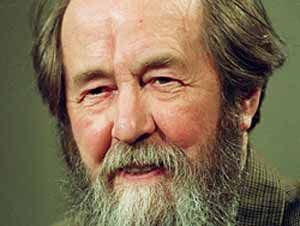10.08.2008
August 07, 2008 (the date of publication in Russian)
Alexander Rudakov
THE SYMBOL OF PATRIOTISM, THE SYMBOL OF FREEDOM
Alexander Solzhenitsyn deceased, being honored in Russia and forgotten by the West
 The death of writer Alexander Solzhenitsyn has become ass symbolic as his life. His writings have once been a banner for all those who did not accept Communist ideology and official Soviet interpretations of history. Later, his ideas were requested by the re-emerging conservative philosophic tradition that marked Russia’s religious and national revival.
The death of writer Alexander Solzhenitsyn has become ass symbolic as his life. His writings have once been a banner for all those who did not accept Communist ideology and official Soviet interpretations of history. Later, his ideas were requested by the re-emerging conservative philosophic tradition that marked Russia’s religious and national revival.
In the last period of his life, Solzhenitsyn became a symbol of Russia, being misunderstood and misinterpreted by the West. The comments of global mass media, following his death, were deplorably superficial, banal and monotonous: on the eve of his expiry, he was reportedly disappointed with the situation in the country and was therefore "politically marginalized", failing "to find a place for himself in Russia" etc. In a chorus, a number of authors, similarly in accord, tried to convince the reader that the writer was "unneeded", "forgotten", that moreover, his will was "paralyzed" and his mind "was fading". These assumptions were also used to interpret the fact that the writer "agreed to invite Putin to his home and to receive the State prize from his hands" – though not being supposed to do that, according to the logic of the same authors. In fact, the thinker whose mind and memory remained clear until the last days, is described by professional Russologists as a mentally disabled hermit.
We often come across biased interpretations of events and processes taking place in Russia. However, the legend about the "abandoned" and "cornered" Solzhenitsyn is beyond the bounds of decency. Western experts deliberately blacked out the recently staged screen version of the novel "In the First Circle" on state-run TV channels, as well as the vivid public discussion of the documentary "Two Hundred Years Together", a most profound research of Russian-Jewish relations, as well as the numerous remarks made by the writer of current historical and foreign policy issues, each time echoed with great interest.
Only four months ago, Solzhenitsyn published a programmatic article "To Drive two Fraternal Peoples into Quarrel", strongly criticizing the attempts to blame Russia for organizing famine in Ukraine and genocide of Ukrainians. His remark that the West "had never tried to learn Russian history, preferring fables, even if they were insane" was left without comments outside Russia and Ukraine. The truth of this remark is now proven with the Western coverage of his expiry.
Western observers preferred to neglect one of the recent expressions of the writer's view, as well as many others before. This silence looked at least cynical. It is well known that the writer understood his mission not in "serving to arts" but in serving to the Truth, primarily, historical truth. Not accidentally, he asked to bury him near Vasily O. Klyuchevsky, an outstanding Russian historian. For Solzhenitsyn, history was a space for the search of moral essence – that is why he hated those who exploited history only as a means for special propagandist operations.
In fact, the myth about the "abandoned Solzhenitsyn" exemplifies the approach of the Western propagandist machine towards any writer, scholar or politician who does not fit into Western standards of a dissident. He was a too inconvenient figure for those who capitalize from painting Russia in black colors, and who are furious over the very fact of a former dissident’s transformation into a symbol of struggle for Russian statehood, culture, and spiritual identity.
However, Solzhenitsyn will be venerated by Russians as the thinker who vindicated both the idea of patriotism and the idea of freedom in his writings. This very synthesis is the most significant \for the Russian audience. After years, this significance will only increase. Overcoming the implications of the catastrophes of 1917 and 1991, and steering Russia to the trajectory of historical development, outlined over a millennium ago, we will address the literary and philosophical heritage of Solzhenitsyn again and again, recognizing the greatness of the man and author who taught the world to live "not according to the lie".
Number of shows: 2218
rating:
3.3
 ENG
ENG 

 ENG
ENG 
